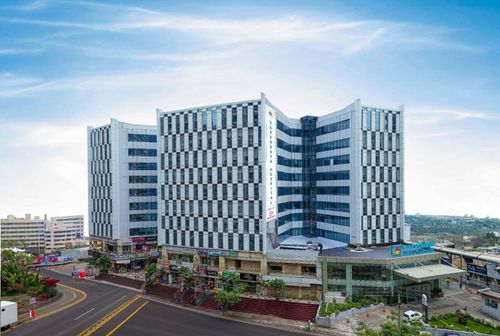Overview
Menopause marks the end of a woman’s menstrual cycle, diagnosed after 12 consecutive months without a period, usually occurring between ages 40 and 55, with an average age of 51. Though natural, menopause often brings challenging symptoms like hot flashes, mood shifts, and sleep disturbances. Menopause symptoms in India can vary based on lifestyle, genetics, and cultural factors.
At Sarvodaya Hospital, our caring team understands these changes and provides guidance and tailored therapies for your comfort. Our menopause specialists in Faridabad combine expertise with a supportive approach, helping women embrace this life stage with confidence and well-being.
Symptoms of Menopause
- Hot flashes and night sweats
- Irregular or missed periods before final cessation
- Sleep disturbances/insomnia
- Mood swings or emotional changes
- Fatigue and low energy
- Vaginal dryness and sexual discomfort
- Decreased libido
- Memory or concentration difficulties
- Weight gain or slowed metabolism
- Thinning hair and dry skin
- Bone or joint pain
Causes of Menopause
- Natural decline in ovarian function and hormone production (estrogen, progesterone)
- Surgical removal of ovaries (surgical menopause)
- Certain cancer treatments (chemotherapy or radiation)
- Premature ovarian insufficiency or early menopause (<40 years)
- Family history and genetics
Diagnosis of Menopause
Diagnosing menopause at Sarvodaya Hospital is a careful, supportive process, focused on your unique health profile. Our menopause clinic uses advanced diagnostics and a holistic approach to confirm menopause and address any related concerns.
- Review of symptoms and menstrual history: We discuss your physical changes, menstrual patterns, and any troubling symptoms to understand your transition and health needs.
- Physical examination: A detailed health check helps assess overall well-being and identify symptoms or signs that may require further attention.
- Blood tests for hormone levels (FSH, LH, estrogen): Measuring follicle-stimulating hormone (FSH), luteinising hormone (LH), and estrogen helps confirm menopause and understand hormone fluctuations.
- Thyroid function tests (to rule out other causes): We check thyroid levels to ensure symptoms aren’t caused by thyroid disorders, which can mimic or complicate menopause changes.
- Bone density testing (if at risk for osteoporosis): If you’re at increased risk, a bone scan helps evaluate bone health and guides recommendations to prevent osteoporosis.
Treatment for Menopause Management
- Hormone replacement therapy (HRT): HRT is recommended for moderate to severe symptoms in suitable women, provided as pills, patches, gels, or implants, and carefully monitored for safety and effectiveness.
- Non-hormonal therapy for specific symptoms: Certain non-hormonal medications may relieve hot flashes, night sweats, and mood swings, offering alternatives when HRT isn’t advised.
- Low-dose antidepressants for mood symptoms: Where mood changes or anxiety prevail, low-dose antidepressants are used to stabilise mood and enhance overall daily functioning.
- Calcium/Vitamin D supplementation: Supplements and lifestyle guidance protect bone health, lowering the risk of osteoporosis and fractures in post-menopausal women.
- Sleep problem management: Supportive therapies, including behavioural guidance and medication if needed, address insomnia or night sweats to improve the quality of sleep.
Prevention & Lifestyle Modification
Proactive lifestyle choices can ease menopause symptoms and protect long-term health. At Sarvodaya Hospital, our team, featuring the best gynaecologist in Delhi NCR, guides women through these strategies for a smoother transition:
- Balanced, calcium-rich diet: Eating plenty of fruits, vegetables, and calcium-rich foods helps maintain energy, strengthen bones, and support overall well-being.
- Regular weight-bearing and muscle-strengthening exercise: Activities like walking, jogging, and strength training improve bone density and help manage weight during menopause.
- Avoiding smoking and excess alcohol: Steering clear of tobacco and limiting alcohol use reduces the risk of osteoporosis, heart disease, and certain cancers.
- Stress reduction techniques (yoga, meditation): Mindfulness practices help lower anxiety and boost your emotional balance through challenging transitions.
- Routine screenings and wellness checks: Regular medical check-ups, including bone density scans and preventive screenings, allow for early intervention and continued good health.
Pre and Post Treatment Lifestyle Modifications
Pre-treatment:- A thorough review helps personalise your care plan, considering your unique risks, needs, and treatment goals.
- Bone density scans, blood pressure checks, and cholesterol tests provide essential information to guide safe and effective therapy options.
- Education and counselling help you anticipate adjustments and adopt coping strategies for common menopause-related challenges.
- Regular check-ups ensure any medication or hormone therapy remains safe and well-tolerated, with prompt management if issues arise.
- Continuing a nutritious diet, regular exercise, and stress management maintains long-term wellness.
- Open communication, medical advice, and counselling address changes in intimacy, mood, or relationship dynamics during menopause.
- Consistent appointments with your healthcare team ensure personalised adjustments and ongoing support for healthy, confident living.















